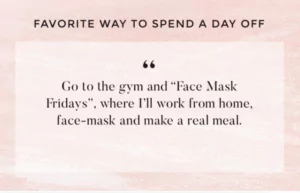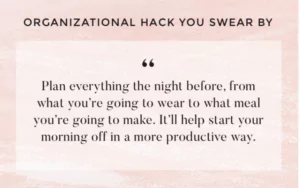Note: This article was originally published on shakticollaborative.co. Some information may be dated given the original publish date.

Atisha Patel is the Co-Founder of a health tech company (NotiCare) and a nonprofit entrepreneurial summer camp (Teenpreneur, Inc). She started her career as a biomedical engineer, but her passion to understand how organizations operate led her to dabble in the startup world. She is a blockchain enthusiast, startup and nonprofit advisor, and a mentor at Yale University’s Center of Innovative Thinking, Venture For America, NextGen, and the Society of Women Engineers at Drexel University. Read on to learn more about how she’s harnessed her entrepreneurial spirit to make an impact on the communities around her.

The Beginning
“I grew up in South Jersey around a pretty large Indian community. We had a Bala Vihar organization at the local Hindu Temple, which essentially served as a cultural youth group for us. I don’t recall much of my experience at Bala Vihar but I do remember my mother signing me up for Bharatanatyam classes in middle school, which were short lived because I quickly realized I had horrible stage fright, two left feet, and no interest in dance!
I joined a youth group at the temple in high school, more for social purposes rather than religious. However, this was an experience that I truly appreciated. While we learned prayers and performed aarti, much of the talks were on a spiritual and cultural level. There was one day when we were asked in class what the meaning of life was. Many of my peers said ‘I don’t know,’ but I remember saying something along the lines of ‘the meaning of life is to figure out your own meaning of life.’ Perhaps that was one of the earliest signs of the journey I was about to go on.”
“I always questioned religion throughout my childhood. When my parents were fasting, I’d ask them questions like ‘What happens if someone is sick? Do they still have to fast? If they didn’t fast, would God hate them?’ I’d ask questions about why women were not allowed to step into the temple if they were menstruating, and about all the things that aren’t really explained to us in Hinduism but are assumed. I’d challenge my parents a lot, and while they often wouldn’t know how to respond to my questions, they never forced religion upon me. After all, my father named me after a Buddhist monk who was thrice enlightened!
One summer, my mother told me why my girl cousins were fasting – to increase their luck of finding a good husband. I quickly tested her, asking why only women were expected to fast when we prayed to both male and female deities. I remember learning about symbiosis (a mutually beneficial relationship between different people or groups) and Newton’s 3rd law of motion (for every action, there is an equal and opposite reaction) and thinking how simple the laws of the universe seemed to be, yet here in real life we had so many other rules! My father finally interjected, explaining that nothing was being forced on me and that religions have similar messages, so I was free to pick. This was his way of telling me to pick something and stick to it, as it would teach discipline and keep me grounded. I didn’t fully appreciate the moment at the time, but I’m grateful my father gave me the space to think on my own.”

“From my mom, I learned what it means to be selfless, but selfish too. She studied business in India, and after marrying my father, moved to the States when she was just 22. She learned to speak English and to drive, and helped my father run his business without any of the support she had back home. She is constantly dropping her plans to help everyone out, not realizing how it’s so easy to spread herself thin and fill other people’s cups before her own. This made me realize the importance of remembering to take care of myself while also helping others. We’re told to put our oxygen masks on first before helping someone else, but we tend to forget that while being people pleasers. My mom taught me the important lesson of learning how to say no, and that it’s okay to fill my cup first.”
From Engineer to Entrepreneur
“I’m constantly asked why I pursued engineering. I chose biomedical engineering out of practicality. Math comes naturally to me and biology intrigues me. Though I wasn’t passionate about it, I hoped the combination of those disciplines would hold my attention, despite lacking an outlet for my introspection and creativity. In fact, I would have majored in philosophy, but I knew there would be more opportunities in engineering.
While I was in undergrad, Drexel had a co-op program where I could get internship experience in conjunction with my academic coursework. I got an opportunity at a small pharmaceutical company, which Novartis ended up acquiring. My friends had taken positions at huge pharma companies, and I remember feeling a little insecure about working at a smaller company – but I didn’t want to be just another number. Looking back now, that experience was invaluable. I got to sit in on meetings with the C suite, manage other interns, and learn what happens to a small company when it’s acquired. While biomedical engineering hammered the creativity out of me for a few years, it taught me strong problem-solving skills.”

“Even with this experience, I wasn’t sure what I wanted to do post-graduation. My friends pursued master’s degrees or went to med school, but all I knew was that I didn’t want to go back to school right away. When I was younger, I had always said I wanted to be a ‘boss’ when I grow up — I think I said that wanting the flexibility of not having to answer to anyone! I saw my parents working long and opposite hours so someone could be home for us and I knew if I was ever a parent, I wanted to make my own hours around my family’s schedule.
I ended up working in pharmaceuticals for a couple years out of school. Then in 2015, I started to grow restless at my current role. So I worked up some courage and went to my first networking event, assuming everyone would already be involved with startups and have some big ideas. To my surprise, this was not the case and I met several women in the same boat as me. One woman even approached me after the event voicing that she’d like to work with me. Her conviction in me what was convinced me to start believing in my capabilities and skill sets.
I spent more time talking with her and learned that I actually had something to bring to the table in terms of strategic thinking. She was building a gamified blockchain application, so I got pulled into those efforts. I spent my days reading white papers, trying to familiarize myself with how that space worked. Blockchain intrigued me, but I realized I was more interested in its healthcare applications. I remember thinking in my first week there that I would have loved to switch our focus to healthcare. I left the startup after a year with a lot more knowledge on how the whole startup ecosystem worked and to never let an opportunity pass you by especially if someone sees something special in you.”

Her Own Venture
“About two years ago, my eventual co-founder Christina and I were volunteering in a hospital as NICU baby cuddlers. After one of those sessions, we headed over to dinner and drinks and started talking about our experiences in the NICU. We’d noticed that parents would keep calling the hospital for updates on their newborns. But every time, nurses would have to check with the physician who was often not available right then, creating major inefficiencies in communication.
During this dinner, I thought back to a Word document I created in college about how I would change the world (literally I’m not kidding hah!). One of the things I had on that list was ‘virtual doctor’s visits,’ which my friends thought would never work, but clearly we see it working in today. Over the years, I’d accumulated all these ideas on this list but never had the business background or courage to actually act upon them.
So right there, we started thinking about how we could build a better communication system between physicians and families. Over two martinis, we started sketching a plan on napkins and went home to buy a domain name (just like the stereotypical entrepreneurship stories!). Soon after, we incorporated our idea into a company, NotiCare.
Our startup bridges a communication gap between doctors and patients’ family members, giving them real time updates. It’s not to completely cut off communication between patient and family, but to streamline communication and not have doctors being bothered every time.
At NotiCare, we’re also looking into the intersection of healthcare and blockchain to understand how we can find a way to decentralize our medical health records. One of our long-term goals is to streamline medical records and make them accessible in moments of need. For example, if someone is in an accident and a doctor needs to retrieve their medical records, is there a way they could quickly and securely access those records through their cell phones?”

“Success in entrepreneurship comes from being creative and learning how to manage stress and expectations. But success is relative and personal. Sometimes people want to group themselves into the cookie cutter entrepreneur who works around the clock, devoting their entire life to their company. But everyone’s different — for instance, Christina and I don’t work on weekends and that’s very intentional. We’re still making strides towards our goals and that’s what matters. I also set Objectives and Key Results (OKRs) for my body, mind and soul at the beginning of each year. That really helps me make sure I’m spending my time appropriately and keeps me grounded.
If you’re interested in creating something, just go try it. Remember when you were younger and your parents made you try every sport and extracurricular activity? You only learned what you liked because you ended up trying them all. I want to encourage people to just do it, and not be fearful. Find a mentor who will support you, and remember that some people will be your cheerleaders and others won’t and that’s completely okay.
If you’re scared about making the jump from a stable job to starting your own company, think about how you can do both. I’m probably the only person who is advising you to keep your day job, but as long as you can prioritize and organize, you’ll figure it out — especially if you’re truly passionate. Christina and I didn’t quit our jobs at the onset, which was scary, because we weren’t sure if people would think we were dedicated enough to NotiCare. We were female entrepreneurs pitching our product, and we had to convince them that we were still putting our hearts and souls into this. Not everyone is as fortunate, but we were fortunate to have that flexibility to run our day jobs and startup passions at the same time.”
On Mentorship and Giving Back

“When I was in college, I didn’t have any mentors, particularly within engineering. I was always idolizing women who were breaking into different spaces, and today, realize that I would have truly benefited from a mentor.
In 2017, Christina and I started Teenpreneur, a summer camp that takes teenagers through a one-week accelerator to practice starting a company from ideation to pitching their own business plans. This effort stemmed back to the Word document I created in college, where I observed that I’d never really been taught how to even conceptualize a business idea as a kid. The purpose of Teenpreneur is to inspire teens to be creative while experiencing real life work situations by playing their given C-suite roles. We give them the opportunity to pitch to local investors and some former Shark Tank presenters and it’s such a fun time. It’s amazing to see the creativity spark among all these students and help them imagine their ideas to life.”“When I was in college, I didn’t have any mentors, particularly within engineering. I was always idolizing women who were breaking into different spaces, and today, realize that I would have truly benefited from a mentor.
In 2017, Christina and I started Teenpreneur, a summer camp that takes teenagers through a one-week accelerator to practice starting a company from ideation to pitching their own business plans. This effort stemmed back to the Word document I created in college, where I observed that I’d never really been taught how to even conceptualize a business idea as a kid. The purpose of Teenpreneur is to inspire teens to be creative while experiencing real life work situations by playing their given C-suite roles. We give them the opportunity to pitch to local investors and some former Shark Tank presenters and it’s such a fun time. It’s amazing to see the creativity spark among all these students and help them imagine their ideas to life.”
On Balance and Inner Strength

“Some people ask me how I’m able to balance running both NotiCare and Teenpreneur while consulting and mentoring on the side. I’ve always been really good at juggling multiple things at once. For me, it’s just innate because I get bored quickly.
Sometimes people get overwhelmed by all they want to do because they compare themselves to others. But these comparisons often diminish your potential to accomplish what you want to. If I need to, I’ll shut down and go off the grid for a day or two, just to take a break and give myself a mental reset. Actually, it’s funny because my father had been trying to teach me yoga and meditation from my middle school years. I would not give him the time of day because I obviously had to get back to my AIM messages after dinner. Years later, I realized how much yoga and meditation helped quiet my mind when it was always racing with to-do lists around bedtime.
Most people also don’t realize that I have acute social anxiety. I didn’t realize it myself until recently! Walking into rooms where I didn’t know anyone used to be nerve wracking and I would avoid it all together. One time, a news casting startup asked me if I wanted to be a host on their philanthropic leg. I tried it out, but every time the camera came close, I would freeze. They suggested I take acting and improv classes, so I took two, which gave me a way of combating my anxiety by acting my way out of uncomfortable situations.”
On Love

“I never really felt immense pressure to meet someone— my independence has always been important to me and my parents were well aware. Growing up, my father would always tell me, ‘you were born old’ and the only beat I drum to is my own so I think he just saves his energy for something more worthy (ha). I have friends who experience the typical pressures from the South Asian community, but you have to learn to take people’s opinions like a grain of salt. Everyone is going to have an opinion, but you control how you let the pressures of life affect you. My parents have been through my relationships with me and understand the good and the bad, or why I might have parted ways with someone. Sometimes when I have my own doubts or think about what family or friends would think if I ended something after introducing him to the family, my parents (especially mom) would remind me that no one’s opinions are worth not being happy over. Not many people are as fortunate as me and I wish I remembered this more often.
Regarding our relationships with our parents, as we get older, it sometimes feels like we’re raising our parents. I chose to be open with mine, and they chose to be open as well. Until you take that step to be vulnerable with them, they’re not going to know what’s going on and how you feel. You have to make that effort and take the time to share your life with them. That’s when you’ll develop a mutual understanding.”
Just for Fun
Author Bio Shakti Collaborative illuminates narratives of strength, choice, and culture in the South Asian community.




Comments